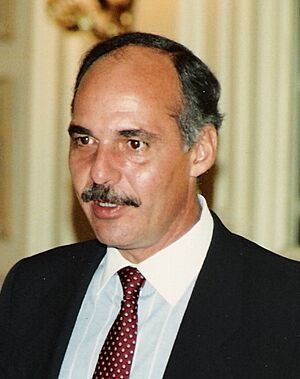Alfredo Cristiani facts for kids
Quick facts for kids
Alfredo Cristiani
|
|
|---|---|

Cristiani in London, September 1989
|
|
| 75th President of El Salvador | |
| In office 1 June 1989 – 1 June 1994 |
|
| Vice President | José Francisco Merino López |
| Preceded by | José Napoleón Duarte |
| Succeeded by | Armando Calderón Sol |
| Personal details | |
| Born |
Alfredo Félix Cristiani Burkard
22 November 1947 San Salvador, El Salvador |
| Political party | Nationalist Republican Alliance |
| Spouse | Margarita Llach de Cristiani |
| Children | 3 |
| Alma mater | Georgetown University |
| Profession | politician |
Alfredo Félix Cristiani Burkard, born on November 22, 1947, is a politician from El Salvador. He served as the President of El Salvador from 1989 to 1994.
Contents
Early Life and Education
Alfredo Cristiani grew up in a wealthy family in San Salvador, El Salvador. His father, Felix Cristiani, was an Italian immigrant, and his mother, Margoth Burkard de Cristiani, had Swiss roots.
He attended the 'Escuela Americana' (American School) in San Salvador. Later, he studied at Georgetown University in Washington, D.C., in the United States. He earned a degree in Business Administration there. After finishing his studies, he returned to El Salvador. He then joined his family's businesses, which included pharmaceuticals, coffee, and cotton. His family also owned a company that was a major supplier of corn seeds in Central America.
In 1970, Alfredo Cristiani married Margarita Llach. They have three children and nine grandchildren.
Start of Political Career
Alfredo Cristiani mostly stayed out of politics until the early 1980s. At that time, El Salvador was going through a difficult period of armed conflict. As the conflict grew, he became involved with a political party called the Nationalist Republican Alliance (ARENA). This party was founded by Roberto D'Aubuisson.
In March 1985, Roberto D'Aubuisson stepped down as leader after ARENA lost the presidential elections. Cristiani then became the new leader of the ARENA party in 1988. In the local and congressional elections held in March 1988, ARENA won many votes. Cristiani himself won a seat in the Congress.
Becoming President of El Salvador
In the 1989 presidential election, Alfredo Cristiani was elected President of El Salvador. He won with 53.8% of the votes. When he took office, it was a significant moment for El Salvador. It was only the second time in the country's history that the ruling party peacefully handed over power to the opposition. His presidency also marked the start of a 20-year period where ARENA held the presidency.
Working with Other Countries
After becoming president, Alfredo Cristiani and his team traveled to many countries. They visited places like Europe, the United States, Mexico, Venezuela, Spain, and other Central American nations. These trips were part of a big effort to gain international support. President Cristiani wanted help for the peace talks his government was holding to end the conflict in El Salvador. Countries like Venezuela, Mexico, and Spain, along with the United Nations, actively supported these peace efforts.
Changes at Home
A major achievement during President Cristiani's time was the successful peace negotiations with the FMLN, a group involved in the conflict. The Salvadoran Civil War officially ended on January 16, 1992. This happened with the signing of the Chapultepec Peace Accords. This agreement brought peace to the country after many years of conflict.
During his presidency, there were also challenges related to human rights.
Economic Changes
President Cristiani also began new economic programs. He started selling some government-owned businesses to private companies. For example, he began the process of selling Salvadoran banks. His government also made it easier for goods to be traded by reducing certain taxes on imports. They also introduced a new tax called the Value Added Tax. Even though tax money collected was reduced, the government continued to spend a lot.
After the Presidency
Alfredo Cristiani left politics in 1994 when his term as president ended. However, he returned as the president of the ARENA party in 2009. This was after the party lost a presidential election for the first time in twenty years.
Youth Penal Code
During President Cristiani's time in office, the National Assembly approved a special law for young people. This law, called the Youth Penal Code, came into effect on May 6, 1995. It protects children from being treated like adults in court. Crimes committed by young people between the ages of 12 and 16 are judged under this special code. The maximum time a minor can be held for a crime was originally 5 years, but it has since been changed to 7 years.
Images for kids
See also
 In Spanish: Alfredo Cristiani para niños
In Spanish: Alfredo Cristiani para niños
 | Emma Amos |
 | Edward Mitchell Bannister |
 | Larry D. Alexander |
 | Ernie Barnes |


